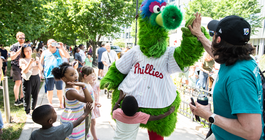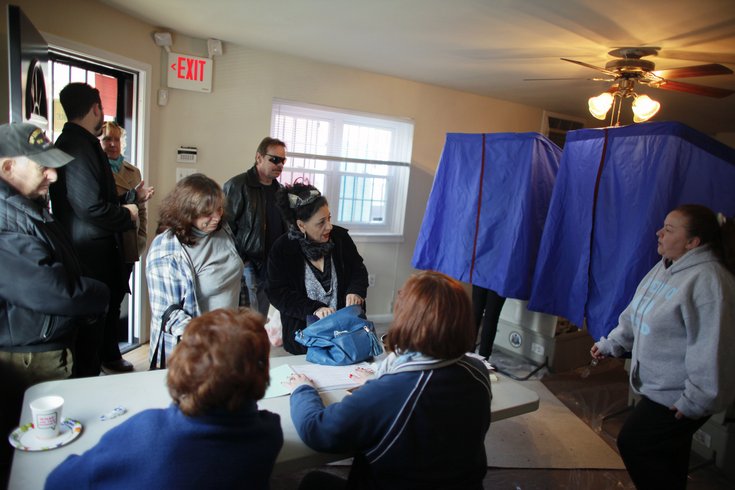
October 07, 2016
 Joseph Kaczmarek/AP
Joseph Kaczmarek/AP
People cast their votes on Nov. 6, 2012, at a 1st Ward polling location in South Philadelphia.
When Donald Trump calls on his supporters in Pennsylvania to "go around and look and watch other polling places" on Election Day to try to combat voter fraud, state Rep. Eddie Day Pashinski gets worried.
"Donald Trump has suggested that there is voter fraud going on throughout the country, that the voting system is rigged," said Pashinski, a Democrat representing Luzerne County.
But that is not true, he said, adding, "Our system in Pennsylvania has been a good check and balance for decades."
Saying Trump merely "suggested" voter fraud is rampant in Pennsylvania is an understatement. The Republican presidential nominee has said flatly that if he doesn't win the key battleground state, it's because of cheating.
The idea of political operatives scouring polling sites to prevent — at least as Trump puts it — nearly inevitable foul play may sound frighteningly vague, but his campaign is leveraging his comments more precisely: A form on Trump's website recruits volunteers to become poll watchers and "stop crooked Hillary from rigging this election."
Poll watchers are regulated and restricted from certain actions, but new legislation could relax one of their key requirements.
These watchers are party volunteers who spend election days in Pennsylvania and across the country looking for potential voting and campaigning violations at polling places. They can issue "good-faith challenges" to individual voters based on residency or identity, according to the Pennsylvania Department of State.
Watchers must remain six feet from the voting area, and can not interact with voters directly. Instead, they must bring prospective challenges to the judge of elections.
Each party is allowed three watchers per polling station, and each candidate can designate two watchers, according to the state department. However, only one per party and one per candidate are allowed inside a polling location at a time. These regulations and restrictions are summarized in the video below from the Pennsylvania Department of State's website.
Poll watchers currently must live in the county in which they operate, but new legislation could change that. House Bill 29 would allow watchers to volunteer in any county in the state, as long as they're Pennsylvania residents.
The bill currently is in the House Appropriations Committee and is written so that it would take effect immediately if passed when the House reconvenes later in October. Democrats have accused the GOP-backed legislation of being a way to promote voter intimidation by allowing outsiders to come in and harass voters by issuing unnecessary challenges.
State Rep. Rick Saccone, R-Allegheny/Washington, the bill's primary sponsor, thinks that argument is "nonsense." He noted how poll watchers would still need to be certified by the counties where they would operate and appointed by a candidate or party. He dismissed the notion the bill would create "gypsy, roving poll watchers."
"It would cut down on voter intimidation," Saccone said. "This is really a good government bill, that I think both sides of the aisle should want."
He noted, in 2008, it was poll watchers who reported members of the Black Panther Party in Philadelphia who were standing outside a polling station in military garb.
"It's a red herring ... The intent is to create a situation at polling locations that make voters uncomfortable." – Rep. Brian Sims
With statewide elections, such as for U.S. senator and president, the proposed law would make it easier for candidates to make sure they have poll watchers positioned across the state, Saccone said. It also would make it easier for legislators like him to recruit watchers whose district encompasses more than one county.
"It doesn’t make sense to limit people to one county when the election affects people in the whole state."
State Rep. Brian Sims, D-Philadelphia, said if Saccone and other Republicans can't organize enough poll watchers in each county, that "speaks volumes" to the party's inability to organize.
At a recent committee hearing on the bill, Sims noted that even in a Democratic stronghold like Philly, there are more than 120,000 Republican voters, plenty to staff watchers at each precinct.
Republicans' reasons for attempting to fast-track the bill are more devious, Sims claims.
"It's a red herring: 'I just want someone to come in and pay closer attention,' That's not the intent here," Sims said. "The intent is to create a situation at polling locations that make voters uncomfortable."
Voter fraud, Sims said, is the "vehicle by which the Republicans systematically" limit voters' access, specifically Democratic voters. He cited voter ID laws as an example — in Pennsylvania, a voter ID law was struck down by a judge in 2014.
"Any behavior that is intended to, or has the effect of, interfering with an eligible voter’s right to vote, constitutes intimidation, should not be tolerated and should be reported." – Wanda Murren, Pennsylvania Department of State
The idea that Democrats steal elections in Pennsylvania via Philadelphia is one that Trump has promoted and is hardly a new accusation. During a Trump event in August in Altoona, U.S. Rep. Bill Shuster, a Republican who represents a large portion of Southwest Pennsylvania, spoke about overcoming "what goes on down in Philadelphia."
"The cheating, what they do – we've got to make sure we're doing the job here in central Pennsylvania," Shuster said, according to the Washington Post.
There are documented cases of voter fraud in the city. Joe DeFelice, executive director of the Republican Party in Philly, recently spoke with Dave Davies of NewsWorks about a 2014 incident in which a six-person election board added votes after polls had closed.
That incident was reported by a Republican poll watcher, and four of the board members faced criminal charges, Davies wrote.
But such incidents are the exception, not the rule, according to David Thornburgh, president and CEO of the Committee of Seventy, a nonpartisan political watchdog group in Philly.
Using a popular line in academia, Thornburgh told PhillyVoice: "The plural of anecdote is not data." In other words, confirmed stories of isolated voter fraud do not represent a systematic problem. Besides, the type of voter fraud that does occur would not be prevented by poll watchers, Thornburgh said.
Thornburgh agreed the voting system has flaws, but a quick fix like House Bill 29 is not the answer. He testified in front of a House committee on the proposal in October and said election officials from all over the state had big questions and concerns about the proposal.
"This sounds like a solution in search of a problem," Thornburgh said.
He's all for taking a thorough look at the dated election code (written in 1937, Thornburgh noted) this coming summer. And he laments how uncompetitive the Republican Party has become in Philadelphia. "Competing candidates and parties make for a strong process."
Thornburgh feels the bill is "politically motivated." When Trump suggests that Pennsylvania may be stolen, "all of sudden it kicks into gear that there's going to be massive cheating, massive fraud, enough to swing an election," something Thornburgh said is "not based on anything other than Donald Trump."
Either way, it's tough to see the bill becoming law before Election Day. Democratic Gov. Tom Wolf opposes it and would likely veto.
Other than House Bill 29, voter intimidation is on the minds of lawmakers in Harrisburg. Another piece of legislation would bump up the penalty for intimidation from a second-degree felony to a first-degree felony, meaning a possible $10,000 fine and 5-year prison sentence. Rep. Pashinski, one of the bill's co-sponsors, said the proposed law would help deter harassment.
"Follow the law, do your job, go vote and don't bother anybody," Pachinski said.
The Pennsylvania Department of State is encouraging voters to know what to do if they're bothered while preparing to cast their ballots — that includes harassment by poll watchers.
"Any behavior that is intended to, or has the effect of, interfering with an eligible voter’s right to vote, constitutes intimidation, should not be tolerated and should be reported," said Wanda Murren, press secretary for the state department.
"Overly aggressive or baseless challenges, and other aggressive behavior at the polling place," she said, "falls into this category."
Pennsylvania's voter guide can be found here.